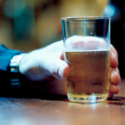City exploring alcohol ban for problem drunks
To address Madison’s ongoing problem with chronic street alcoholics, a new list could soon be making its way to liquor stores across the city that would prevent those on it from buying alcohol.
While city staffers and members of the Alcohol License Review Committee (ALRC) still are working out the details, finding one’s way onto the “alcohol ban list,” as it is currently referred to, would be no easy task. In order to be placed on the list, an individual must be deemed a “habitual drunkard,” a term currently found in an old state statute, but not defined anywhere. Once the term is defined, the list can be created.
Katherine Plominski, the city’s alcohol policy coordinator, said guidelines now being considered would define a habitual drunkard as someone who has received a combination of six or more alcohol-related citations or detox center referrals within a year. If those guidelines were put in place today, she said, 35 to 40 people in Madison would be placed on the city’s alcohol ban list.
“The people who would be put on this list are people with severe, severe issues with alcohol,” Plominski said. “They are not the kind of people that should be purchasing alcohol in our city.”
By the end of the month, those involved with the process to ban certain people from buying alcohol plan to submit either clarifications to the current “habitual drunkard” ordinance or submit a new policy to the ALRC and the City Council for adoption.
“We are not looking to put 100 people on this list,” said Madison Police Capt. Joe Balles. “But for those who need it, somebody somewhere should be making it harder for some of these people to buy alcohol.”
If the new guidelines are adopted, an individual would be removed from the list if they were able to go 180 days without being sent to detox or receiving an alcohol-related citation. Those on the list would still be able to walk into a bar and order a drink. They just can’t leave an establishment with alcoholic beverages.
“The ALRC is not a social agency, but we are trying to identify support services so it does not come down like we don’t care about these people,” said Michael Schumacher, a member of both the City Council and the ALRC. “Other the other hand, it’s not good for the community when you have people waiting in line several times throughout a day to get their next drink.”
Plominski said the current draft of the ordinance focuses on liquor store sales rather than drinks at bars because the target population generally isn’t buying alcohol in bars, where the alcohol is much more expensive.
Last year, the ALRC banned some downtown liquor stores from selling certain types of alcohol, namely 40-ounce beers, four-packs of beer and small, 200-milliliter liquor bottles that sell for about a dollar each. The banned products were chosen because they are inexpensive, enabling panhandlers to raise enough money several times throughout a day to purchase alcohol, Plominski said.
The ALRC had considered proposing a citywide ban, but backed off under pressure from the Dane County Tavern League. The new move to now ban people, rather than products, is being viewed more favorably by the tavern league.
“If the purpose of the list is to crack down on chronic drunkards in downtown Madison, the Dane County Tavern League will not have a problem with it,” said Barb Mercer, the group’s president and the owner of Pitcher’s Pub in Madison. “I don’t think we would oppose it at this point, but we are pretty gun shy with anything they do,” referring to the ALRC.
Once the term habitual drunkard is defined, authorities can fine liquor store owners or revoke, suspend, refuse to issue or refuse to renew their liquor licenses if store owners are found to be serving chronic alcoholics. Very few municipalities have defined what a habitual drunkard is, however.
Green Bay is an exception. About 10 years ago, its police came to the same conclusion as officials in Madison. Too often, they were receiving alcohol-related calls from the same area of town — Broadway Street on the city’s west side.
“It was nothing to go down there and see people falling down drunk, passed out in doorways or asleep next to the street,” Green Bay Police Capt. Bill Galvin said. “Nobody wanted to live down there.”
That’s not the case anymore. The Green Bay Police Department, in conjunction with city officials, put together a “no sell, no serve” list. People are placed on the list who receive three alcohol-related citations or trips to detox within a year. To be taken off the list, individuals must contact the police department to request a review. There are currently 68 people on Green Bay’s “no sell, no serve” list.
These days, drinks are still served on Broadway, but the establishments from which they are sold are more upscale. Besides implementing the list, the city also offered tax incentives to attract new businesses to Broadway. It then slowly started buying up the bars.
“It’s a totally different area now,” Galvin said. “These days, the calls are nothing.”
Galvin isn’t naive about compliance. He said officers became aware of a few problem establishments. In order to educate those businesses on why they needed to comply with the law, officers issued citations for serving intoxicated people. The fine is $361.
“It’s sad,” Galvin said. “When you take away the law portion of it and look at the human side of the issue, alcohol is a drug. Some will argue it is better to hold the individual responsible, but if they have an addiction, it is the responsibility of society to take a look at the problem and help out.”
source: Capital Times
